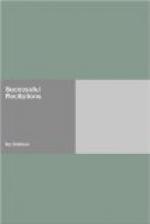In the morning I ventured cautiously out, and finding he was in our spare bedroom, I shut the door upon him. I then sent for a large sack, and with the help of the tablecloth, and the boy who cleans our boots, we got him into it without any further personal damage. I took him off in this way to the station, and confided him and the parrot to the guard of the early train. As the train moved off, I heard a yell and a very improper expression from the guard. I have reason to believe that the stork had freed himself from the wrapper, and had begun pecking again.
We have determined that, taking our chance about a place in my uncle’s will, we will never again have anything to do with any foreign birds, however much he may ask and desire it.
AN UNMUSICAL NEIGHBOUR.
BY WILLIAM THOMSON.
I once knew
a man who was musical mad—
A hundred
years old was the fiddle he had;
I never
complained, but whenever he played
I wished
I had lived when that fiddle was made.
THE CHALICE.
BY DAVID CHRISTIE MURRAY.
Swift, storm-scud, raced the
morning sky,
As light along the road I fared;
Stern was the way, yet glad was I,
Though feet and breast and brow were bared;
For fancy, like a happy child,
Ran on before and turned and smiled.
The track grew fair with turf
and tree,
The air was blithe with bird and flower.
Boon nature’s gentlest wizardry
Was potent with the bounteous hour:
A raptured languor o’er me crept;
I laid me down at noon and slept.
I woke, and there, as in a dream,
Which holds some boding fear of wrong,
By fog-bound fen and sluggard stream
I dragged my leaden steps along.
My blood ran ice; I turned and spied
A shrouded figure at my side.
“And who art thou that
pacest here?”
He answered like a hollow wind,
Not heard by any outer ear,
But in dim chambers of the mind.
“I walk,” he said, “in ways
of shame,
The comrade of thy wasted fame.”
A passion clamoured in my breast,
For mirthless laughter, and I laughed;
In mine the phantom’s cold hand pressed
A cup, and in self’s spite I quaffed.
It clung like slime; ’twas black like
ink:
Death is less bitter than that drink.
“This chalice scarce can
fail,” said he,
“Till thou and I shall fail from earth;’
And we will walk in company,
And waste the night with shameful mirth.
I pledge thy fate; now pledge thou mine.”
I pledged him in the bitter wine.
“Had’st thou not
slept at noon,” he said,
“Thou should’st have walked in
praise and fame.
Now loathest thou thine heart and head,
And both thine eyes are blind with shame.”
His voice was like a hollow wind
In dim death-chambers in the mind.




